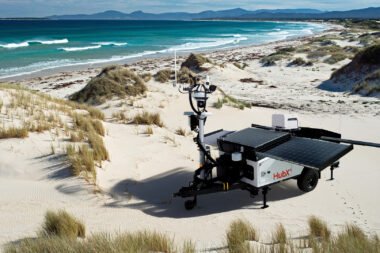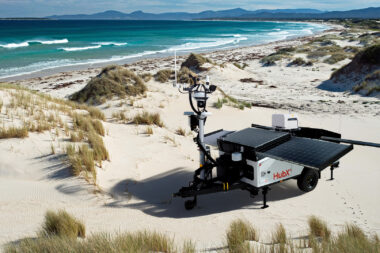As Australia braces for the onset of summer, the looming threat of catastrophic bushfires and floods becomes a critical concern for communities nationwide. Gender and Disaster Australia (GADAus) is urging Australians to prepare for these potential disasters with gender-responsive planning, recognising the disproportionate impacts that disasters can have on women, children, and LGBTIQA+ people.
Following record-breaking bushfires in 2019-2020 and widespread flooding in 2022-2023, experts are warning that this summer could bring yet another season of scorching temperatures and extreme weather events. As conditions become increasingly volatile due to climate change, with high temperatures, severe storms and a wet summer anticipated in Australia, it is essential that communities act now to mitigate the risks and prepare.
One of those risks is a proven increase in domestic and family based violence.
GADAus is Australia’s leading national organisation providing evidence-based education, training, and resources to address the harmful impacts of gendered expectations in disasters. GADAus trains people and organisations to help prevent and control violence, abuse and discrimination against women, children and LGBTIQA+ people, and men’s self-harm and suicide, before, during, and after emergencies and disasters. It also advises Councils on establishing safe evacuation centres.
“Disasters do not impact everyone equally. Women, people with disabilities and LGBTIQA+ community members often face specific risks and these must be kept in mind,” says GADAus lead trainer Rachael Mackay.
“Women are often tasked with caring for children and pets and may delay evacuation (and die as a result) or neglect their own safety to care for others. More men die staying at home to defend, when they would have been safer to leave.
“It is vital that as we prepare for potential disasters this summer, we take into consideration how gendered expectations affect how people behave under pressure,” Ms Mackay says.
The way men and women act is often the result of social conditioning and these gendered roles can leave women at a disadvantage both during and after disasters. Men can also be traumatised by what they see during disasters and the unrealistic expectations of them to be heroes. They can suffer self-blame and guilt if they fail to live up to the stereotype of provider and protector and are often unwilling to seek mental health help. This can cause men to have untreated post-traumatic stress, and can contribute to some men taking their own lives.
“Our research over 15 years indicates that disaster impacts can be severe, long-lasting and different for women, men, and non-binary people,” Ms Mackay says.
The increased polarisation of gender stereotypes under disaster conditions, when stress and instability can escalate existing tensions within households, amplifies any already unequal relations between women and men.
Research shows that communities can often excuse and minimise domestic violence after disasters.
“However, violence is a choice, and disaster is no excuse for it,” Ms Mackay says.
The Role of Emergency Management
Emergency management can play a part in preventing domestic violence after disaster in planning, response and recovery stages.
“We are training the emergency management sector around Australia to be alert to the increase of family violence after disasters and ensure those working in human services post-disasters can identify and respond effectively to family violence,” Ms Mackay says.
“More women first responders would help to free up gender stereotypes. The capacity of Australia’s emergency services organisations could be doubled if traditional and persistent barriers to women and LGBTIQA+ people are removed. Capacity can be further increased if masculinity is recast away from heroism and machismo. Emergency response to events like major bushfires and floods demands ‘all hands on deck’ and now is the time for the sector to adapt,” she says.
GADAus trainer and firefighter with 35 years experience, Steve O’Malley, says firefighters don’t want to be heroes, they want communities to prepare better next time and heed warnings to leave.
“One of the best ways to prepare is to know how individuals respond to pressure, regardless of their gender, and let people play to their strengths.
“Not all men want to be the protector, and it doesn’t serve everyone’s best interests if women are expected to put their needs last.
“Our GADAus training can help communities and first responders free themselves and others from gendered expectations so they can more effectively respond to disasters and take care of each other in the aftermath,” O’Malley says.
What can be done to prepare?
-
Include women at all levels in disaster response and recovery planning bodies.
-
Ensure evacuation centres are safe for women and cater to their needs.
-
Educate disaster-prone communities about the probable health effects of disaster before a disaster occurs, including domestic and family violence and the possible exacerbation of previous traumas.
-
Tailor Mental Health First-Aid courses to include disaster trauma and the probability of increased family violence, and provide them annually to communities in disaster-prone areas.
-
Develop strategies to prevent and respond to domestic and family violence within communities after a disaster.
-
Increase long-term funding for domestic and family violence services in communities impacted or likely to be impacted by disaster.
-
Prioritise the needs of all sole adults with small children escaping disasters in planning.
-
Include domestic and family violence services in regular meetings of organisational and community preparation meetings.
GADAus offers its online and in-person Lessons in Disaster (LIDs) training across Australia to first responders, emergency management personnel, health and community services, and disaster-prone communities, to develop greater understanding of how gendered stereotypes and expectations are exacerbated in disasters and help improve disaster management and survival outcomes.
GADAus received a Commonwealth grant under the National Plan to End Violence Against Women and their Children 2022-2032 to train 1000 responders over four years, and has exceeded that target already in 18 months.
GADAus also advises Councils on how to plan safer Evacuation and Relief Centres and recently received additional funding through the Commonwealth Disaster Ready Grants, to work with every council in Victoria, and disaster high risk councils in NSW, to help make evacuation centres safer for everyone.
For media and more information contact:
Linda Apps M: 0433 999 017 E: [email protected]
Carolin Wenzel M: 0417 668 957 E: [email protected]
Melesa Osborne M: 0425 823 064 E: [email protected]
Key Facts:
Proven increase in domestic and family violence after disasters
More disasters expected with climate change
More women and children die because they delay evacuation to stay with their partner
More men die staying at home to defend, when they would have been safer to leave
About us:
Holding a vision for an Australian society that recognises and acts to prevent the harms of rigid gendered stereotypes in disasters, we work to inform inclusive and evidence-based responses to disaster and emergency management.
Contact details:
For media and more information contact:
Linda Apps M: 0433 999 017 E: [email protected]
Carolin Wenzel M: 0417 668 957 E: [email protected]
Rachael Mackay GADAus Head Trainer M:0402579590 E:[email protected]
Melesa Osborne M: 0425 823 064 E: [email protected]


